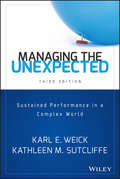- Table View
- List View
Managing the Transition to a Circular Economy: Action Plans in the Tourism Sector (SpringerBriefs in Business)
by Virginia Santamarina-Campos Marival Segarra-Oña Ángel Peiró-SignesThis open access book presents an interdisciplinary analysis of the current status of the circular economy in the tourism sector. This book is presented from the perspective of researchers, policymakers, and industry. Specially aimed at companies in the tourism sector, the book offers valuable information in the field of circular economy, promoting the design/redesign of processes and products. The authors emphasize promoting the development and application of new knowledge and technologies to promote innovation in processes, products, services, and business models, promoting public-private collaboration. With contributions from experts representing varied interests throughout the tourism industry, the book encourages the involvement of economic and social agents to raise awareness of current environmental, economic, and technological challenges.
Managing the Transition to a Low-Carbon Economy: Perspectives, Policies, and Practices from Asia
by Masahiro Kawai Venkatachalam Anbumozhi Bindu N. LohaniAsia must be at the center of the global fight against climate change. It is the world's most populous region, with high economic growth, a rising share of global greenhouse gas emissions, and the most vulnerability to climate risks. Its current resource- and emission-intensive growth pattern is not sustainable. This study recognizes low-carbon green growth as an imperative-not an option-for developing Asia.Asia has already started to move toward low-carbon green growth. Many emerging economies have started to use sustainable development to bring competitiveness to their industries and to serve growing green technology markets.The aim of this study is to share the experiences of emerging Asian economies and the lessons learned. The book assesses the low-carbon and green policies and practices taken by Asian countries, identifies gaps, and examines new opportunities for low-carbon green growth.
Managing the Transition to a Sustainable Enterprise: Lessons from Frontrunner Companies
by Mara Francken Rob van Tulder Rob van Tilburg Andrea da RosaIn combining practice and theory, this textbook provides a management perspective on the ‘business case’ for sustainability. Drawing on examples from 20 frontrunner companies located in the Netherlands, it builds upon a unique research project in which CEOs and middle-managers gave access not only to their decision-making process, but also revealed how their perceptions shaped the transition process. This book identifies four different archetypes of business cases and related business models that business students and managers can use to identify phases and related attitudes towards sustainability. The book provides in-depth analysis and insight into: • theoretical concepts and an overview of the relevant literature • the different business cases for sustainability • behavioural characteristics of each phase and the typical barriers between them • more than 70 tipping points • approaches to shaping stakeholder dialogue • effective engagement of stakeholders in each phase of transition • how companies move through the phases towards higher levels of sustainability • insights of employees of the 20 companies whether the business case was really achieved • summary of the interventions which have proved successful in these companies. This book offers students as well as managers of vocational and academic institutions at undergraduate and postgraduate level insight into real-life transition processes towards sustainability.
Managing the Unexpected
by Karl E. Weick Kathleen M. SutcliffeSince the first edition of Managing the Unexpected was published in 2001, the unexpected has become a growing part of our everyday lives. The unexpected is often dramatic, as with hurricanes or terrorist attacks. But the unexpected can also come in more subtle forms, such as a small organizational lapse that leads to a major blunder, or an unexamined assumption that costs lives in a crisis. Why are some organizations better able than others to maintain function and structure in the face of unanticipated change? Authors Karl Weick and Kathleen Sutcliffe answer this question by pointing to high reliability organizations (HROs), such as emergency rooms in hospitals, flight operations of aircraft carriers, and firefighting units, as models to follow. These organizations have developed ways of acting and styles of learning that enable them to manage the unexpected better than other organizations. Thoroughly revised and updated, the second edition of the groundbreaking book Managing the Unexpected uses HROs as a template for any institution that wants to better organize for high reliability.
Managing the Unexpected: Resilient Performance in an Age of Uncertainty
by Karl E. Weick Kathleen M. SutcliffeSince the first edition of 2001 it appears that we are dealing more and more with the unexpected, and not just in the form of news about terrorist attacks. Fires, floods, hurricanes, financial disasters, tornadoes and even the occasional volcano seem to be on the increase, with the result being a constant state of apprehension and, in the case of many organizations, sense of perpetual panic. Weick and Sutcliffe (organizational behavior and psychology, and management and organization, respectively, U. of Michigan Business School) update the text to reflect current conditions, laws, practices and policies as they get managers ready to expect the unexpected and plan accordingly. They admit that in real life everything can go wrong, but they do show models in which the unexpected is part of daily life, such as emergency rooms and airports, and how managers cope. Annotation ©2007 Book News, Inc., Portland, OR (booknews.com)
Managing the Unexpected: Sustained Performance in a Complex World (J-b Us Non-franchise Leadership Ser. #8)
by Karl E. Weick Kathleen M. SutcliffeImprove your company's ability to avoid or manage crises Managing the Unexpected, Third Edition is a thoroughly revised text that offers an updated look at the groundbreaking ideas explored in the first and second editions. Revised to reflect events emblematic of the unique challenges that organizations have faced in recent years, including bank failures, intelligence failures, quality failures, and other organizational misfortunes, often sparked by organizational actions, this critical book focuses on why some organizations are better able to sustain high performance in the face of unanticipated change. High reliability organizations (HROs), including commercial aviation, emergency rooms, aircraft carrier flight operations, and firefighting units, are looked to as models of exceptional organizational preparedness. This essential text explains the development of unexpected events and guides you in improving your organization for more reliable performance. "Expect the unexpected" is a popular mantra for a reason: it's rooted in experience. Since the dawn of civilization, organizations have been rocked by natural disasters, civil unrest, international conflict, and other unexpected crises that impact their ability to function. Understanding how to maintain function when catastrophe strikes is key to keeping your organization afloat. Explore the many different kinds of unexpected events that your organization may face Consider updated case studies and research Discuss how highly reliable organizations are able to maintain control during unexpected events Discover tactics that may bolster your organization's ability to face the unexpected with confidence Managing the Unexpected, Third Edition offers updated, valuable content to professionals who want to strengthen the preparedness of their organizations—and confidently face unexpected challenges.
Managing the Urgent and Unexpected: Twelve Project Cases and a Commentary (Advances in Project Management)
by Stephen Wearne Keith White-HuntSometimes unanticipated threats or opportunities create a situation in which work is required unexpectedly. On these occasions, such urgent and unexpected work demands an instant start, in contrast to the often lengthy processes of investigation, evaluation, development, selection and planning normal in businesses and public services before the start of a project. Managing the Urgent and Unexpected explores what is different managerially if work is unexpected, its implementation is urgent and an immediate start it is required. The authors draw on twelve cases ranging from the launch of the Freeview television system in the United Kingdom to the sifting and removal of the New York World Trade Center pile of debris following the 9/11 terrorist attack. They summarise how the response to each of these events was managed, demonstrate that opportunities may sometimes be created in the face of adversity and suggest how normal organizations can prepare to manage abnormal demands. Urgent and unexpected projects have to be rare in business or government to be economically and socially tolerable. And yet organizations can and should be prepared for the unexpected. The lessons offered here will help private and public organizations plan how to authorize and support future urgent work to take advantage of immediate new business opportunities or to protect or restore systems and services.
Managing the Wealth of Nations: Political Economies of Change in Preindustrial Europe
by Philipp Robinson Rössner‘Commerce and manufactures gradually introduced order and good government,’ wrote Adam Smith in his Wealth of Nations, ‘and with them, the liberty and security of individuals.’ However, Philipp Robinson Rössner shows how, when looked at in the face of history, it has usually been the other way around. This book follows the development of capitalism from the Middle Ages through the industrial revolution to the modern day, casting new light on the areas where premodern political economies of growth and development made a difference. It shows how order and governance provided the foundation for prosperity, growth and the wealth of nations. Written for scholars and students of economic history, this is a pioneering new study that debunks the neoliberal origin myth of how capitalism came into the world.
Managing the Work Situation: A Phenomenological Approach to Organization and Management in a Complex World of Work
by Lars KlemsdalManaging the Work Situation outlines a perspective on how organization and management in the contemporary world of work happens as active everyday accomplishments by workers and managers, facing and handling complex work situations with an excess of expectations.Based on philosophical and sociological phenomenology, notably Jean-Paul Sartre’s and Erving Goffman’s works, the book coins a situation-centric perspective on organization and management, and the concept of ‘situational sensemaking’, as the driving mechanism of organization as well as the focus of management – characterized as ‘situation management’.The book addresses an academic audience with interests in organization and management of work, both theoretically and practically. A prime audience will be (academic and executive) master students in organization and management.
Managing to Change the World
by Alison Green Jerry HauserWhy getting results should be every nonprofit manager's first priority A nonprofit manager's fundamental job is to get results, sustained over time, rather than boost morale or promote staff development. This is a shift from the tenor of many management books, particularly in the nonprofit world. Managing to Change the World is designed to teach new and experienced nonprofit managers the fundamental skills of effective management, including: managing specific tasks and broader responsibilities; setting clear goals and holding people accountable to them; creating a results-oriented culture; hiring, developing, and retaining a staff of superstars. Offers nonprofit managers a clear guide to the most effective management skills Shows how to address performance problems, dismiss staffers who fall short, and the right way to exercising authority Gives guidance for managing time wisely and offers suggestions for staying in sync with your boss and managing up This important resource contains 41 resources and downloadable tools that can be implemented immediately.
Managing to Collaborate: The Theory and Practice of Collaborative Advantage
by Chris Huxham Siv VangenCollaboration between organizations on different continents can raise issues of economic development, health, the environment, risk sharing, supply chain efficiency and human resource management. It is an activity that can touch upon almost every aspect of business and social life. In this notable text, the authors combine rigorous theory with practical examples to create a useful, practical, one-stop resource covering topics such as: the principles of the theory of collaborative advantage managing aims membership structures and dynamics issues of identity using the theory. The key features of the book include rich theory, drawn directly from practice, explained in simple language, and a coherently developed understanding of the challenges of collaboration, based on careful research. This significant text will be an invaluable reference for all students, academics and managers studying or working in collaboration.
Managing to Make a Difference: How to Engage, Retain, and Develop Talent for Maximum Performance
by Kim Turnage Larry SternbergA practical, real-world training manual for mid-level management Managing to Make a Difference presents a leadership guide for those in the middle. The C-suite has a wealth of resources for leadership guidance, but middle managers face a quandary: often given little guidance on how to excel, they are also under enormous pressure to do a variety of things other than "lead." This book provides much-needed tools and techniques for building a high-performing team—without letting your other duties suffer. Organized around a coherent philosophy and based on solid research, the discussion offers a roadmap to engagement, talent development, and excellence in management. From difficult situations and organizational challenges to everyday motivation and inspiration, these techniques help middle managers achieve the goals of their organization while empowering their workers to achieve their own. Talent development is probably not your full-time job—yet it drives the engagement that results in high performance. This book shows you how to hit the "sweet spot" of middle management, with a host of tools and strategies to help you help your team shine. Motivate, inspire, and lead your team with confidence Manage through challenges and overcome obstacles Develop key talent and maintain high engagement Adopt practical management tools based on substantiated research Most organizations direct the majority of their development resources to the C-suite, but still expect their mid-level managers to attract, engage, retain, and develop talent; but successfully juggling everyday duties while maintaining team performance and leading around roadblocks leaves little room for management planning. Managing to Make a Difference offers the solution in the form of tools, techniques, and practical strategy for a high performing team.
Managing to Manage
by Derek TorringtonToday's managers often find themselves thrust into HR-type situations presenting both challenge and opportunity, often struggling to make the right decisions for the business and for the people involved. Managing to Manage provides the essential understanding to cope with the core demands of people management, grounding the advice in clear examples and familiar situations. Split into two parts, the book explains the role of the manager and then demonstrates how to fulfil that role, taking a practical, hands-on approach. It's packed with unique key concepts, which guide the manager through essential skills, while forming a quick reference guide for the rest of their careers. Managing to Manage is a comprehensive, practical guide tackling all challenges of managing people at work.
Managing to the New Regulatory Reality
by Gregory P. Wilson Richard K. DavisHow to manage and profit from the new financial regulatory realityNow, more than ever, navigating the new financial regulations is paramount for the survival of many large institutions. Managing to the New Regulatory Reality: Doing Business Under the Dodd-Frank Act provides the most important, need-to-know lessons for private sector management, boards of directors, policymakers, and even regulators, shedding light on the movement from crisis to panic, regulatory reform to winning under continuing financial regulatory uncertainty.Reviews the causes of 2008's financial crisis, and assesses its impact on multiple stakeholdersDescribes and analyzes the impact of the immediate U.S. and G20 policy and regulatory reactions on financial institutions that the crisis response triggeredExplains the legislative policies, and examines how institutions and the financial services industry can make these new policies and regulations work for themAll financial institutions, but especially large companies, will have to aggressively manage to the new regulatory reality. Managing to the New Regulatory Reality is the must-have survival guide to sustaining profitability despite all the new red tape.
Managing with Analytics at Procter & Gamble
by Thomas H. Davenport Marco Iansiti Alain SerelsSenior management at P&G has put a strong emphasis on using data to make "better, smarter, real-time business decisions." The Global Business Services (GBS) organization has developed tools, systems and processes to provide managers throughout P&G with direct access to up-to-date data and advanced analytics. In addition, GBS has embedded analysts within the business units to work alongside leaders and managers in driving real-time information-based decision making. Equipped with the tools provided by GBS, Alan Torres, vice-president of North America Fabric Care, must finalize the forecast for P&G's laundry detergent sales. Results for the two months since introducing concentrated powder laundry detergent in select retailers saw a surprising jump in sales of over 10%, but would the trend continue as the concentrated detergents were introduced across North America?
Managing with Dual Strategies
by Derek F. AbellRarely, if ever, do companies clearly distinguish between or balance the management of today's business and planning for the future. Derek Abell, internationally renowned for his pioneering work on strategic market planning, once again breaks sharply with conventional wisdom to demonstrate how a company can develop analytic marketing modes for not one but two distinct planning horizons. Managing with dual strategies, Abell argues, calls for new approaches not only to planning, but to organizational structure and management control. He makes specific recommendations on how current operating practices need to be adapted, and shows how leading firms are recognizing the dual nature of management as a new way of organizational life. Planning for the present, Abell shows, requires a vision of how the firm must operate now given its unique competencies and resources. By involving each level within the management team from the CEO to financial planners, to line managers, Abell details how firms can pinpoint market opportunities through careful segmentation and identification of key success factors to "connect" with customers. At the same time, he distinguishes the importance of horizontal relationships for defining and focusing on internal strategies, and vertical relationships for being attuned to changing market realities. Success today, he warns, does not ensure success tomorrow. Abell describes how world-class leaders such as Nestlé, Caterpillar, and Heineken monitor both internal and external forces for market change, successfully mastering the present, and preempting the future. Preparing for the future requires understanding the full range of activities industry-wide, and anticipating changes in technology, buyer/seller behavior, and product life cycles. Abell explains how companies can develop and implement these co-existing visions and address the real forms of change that vitally affect their future -- today and tomorrow.
Managing with Humor: Building Positive Employee Emotions And Psychological Resources
by Ramanie Samaratunge Nilupama Wijewardena Charmine Härtel<P><P>This book focuses on an emerging area of study in management: managerial humor and its impact on employees' outcomes. Drawing from theoretical work that advocates humor as a managerial tool and building on existing theory and documented evidence on humor, the book explores how managers can use humor to positively affect employees’ short-term emotional states and long-term psychological resources at work, and thus reduce the likelihood of their leaving the organization. <P><P> First, the book develops a theoretical framework for humor events at work and provides evidence-based findings on employees’ humor behavior within actual work contexts. Second, it explores how humor can be used to positively impact employees’ emotional states at work. In doing so, the book takes a multidisciplinary approach to humor by integrating theory and findings from the emotions literature, Positive Organizational Behavior, and Broaden and Build Theory into the humor literature. <P><P> The book sheds new light on the consequences of managers’ use of humor for employees. It provides practical guidelines on how managers can use humor as an effective tool at work to bring about desired employee outcomes.
Managing with Sense and Sensitivity: Professionalism in Leadership
by Christer Sandahl Mia von KnorringManagers wrestle daily with emotional leadership challenges because emotions and relationships influence organizational energy, commitment, and financial results. This book helps managers strike a balance between feeling and reason in a professional and ethical manner with attention to the manager’s position in the hierarchy of the organization. The authors argue that all managers need to develop their own leadership style based on who they are as persons, their convictions and the circumstances in which they find themselves. This book shows managers how to use judgement, experience, reflection and general knowledge to be better leaders. The book also describes managerial responsibility for the conditions that create a compassionate and effective work environment where emotions can be expressed in ways that constructively benefit the entire organization
Managing your Sales Force: A Motivational Approach
by Pingali VenugopalSalespersons occupy a vital position in most organizations yet they tend not to hold their profession in high esteem. According to the author of this book, unless salespersons take pride in their work, they are unlikely to perform to the best of their abilities. This, in turn, is bound to affect the organization in terms of both its growth and its profit. Pingali Venugopal approaches the sales management function from the motivational dimension in order to revive the lost vocational esteem in the sales profession. Divided into two sections, this book - takes an integrated view of management decisions, both strategic and operational, and works out each as a motivator for the salespersons; - emphasizes the need for managers to motivate salespersons, beyond the commonly used monetary incentives; - highlights the importance of behavioural transactions that have to take place for a sale to be successful; - develops a framework to integrate the sales management function with the marketing mix so that there are no overlaps; and - stresses the need to devise appropriate training programmes for salespersons.
Managing: What Managers Do - And Can Do Better (16pt Large Print Edition)
by Henry MintzbergA half century ago Peter Drucker put management on the map. Leadership has since pushed it off. Henry Mintzberg aims to restore management to its proper place: front and center. &“We should be seeing managers as leaders.&” Mintzberg writes, &“and leadership as management practiced well.&” This landmark book draws on Mintzberg's observations of twenty-nine managers, in business, government, health care, and the social sector, working in settings ranging from a refugee camp to a symphony orchestra. What he saw—the pressures, the action, the nuances, the blending—compelled him to describe managing as a practice, not a science or a profession, learned primarily through experience and rooted in context.But context cannot be seen in the usual way. Factors such as national culture and level in hierarchy, even personal style, turn out to have less influence than we have traditionally thought. Mintzberg looks at how to deal with some of the inescapable conundrums of managing, such as, How can you get in deep when there is so much pressure to get things done? How can you manage it when you can't reliably measure it? This book is vintage Mintzberg: iconoclastic, irreverent, carefully researched, myth-breaking. Managing may be the most revealing book yet written about what managers do, how they do it, and how they can do it better.
Manchester Bidwell Corp. (A)
by James L. HeskettThe head of Manchester Bidwell Corp. ponders what it will take to replicate its social services in 100 cities across North America and internationally--an effort that ultimately would cost several hundred million dollars.
Manchester Products: A Brand Transition Challenge
by John A. Quelch Heather BeckhamIn January of 2005, Manchester Products Inc., a longtime leader in office furniture that only recently entered into the home furniture market, acquired Paul Logan's Furniture Division (PLFD). The acquisition of PLFD made Manchester an instant market leader in household furniture. A key factor in the value of PLFD has been the name of the company founder -- arguably the premiere name in high-end fashion and accessories, and a true lifestyle brand. However, Manchester has acquired rights to use the Paul Logan brand name for only three years. Jason Adams, VP of Marketing for Manchester, is responsible for designing a plan to transition the brand from the Paul Logan name to Manchester. He must develop the optimal timing and sequencing of the brand transition, assess the implications, and establish the appropriate mix of advertising and promotion programs to support the transition.
Manchester: The Mills and the Immigrant Experience
by Gary SamsonThis fascinating and moving book brings to life the industrial and immigrant experience which gave birth to Manchester in the nineteenth century and continued to shape the city's destiny well into the twentieth century. More than a hundred years ago, thousands of immigrants from Europe and Canada were drawn to the mills of Manchester by the promise of a better life. In stirring photographs and text, Manchester: The Mill and the Immigrant Experience examines the aspirations, the struggles, and the everyday adventures of Manchester's immigrant families. Reaffirming the power of photography to move and inform us, Manchester: The Mills and the Immigrant Experience creates a vivid picture of life during nearly a century of rapid industrial change. We join the bustle of Elm and Hanover Streets in the 1880s, witness children working at the mighty Amoskeag Manufacturing Company, enter a Greek coffeehouse in the early 1900s, get caught up in the bitter labor strikes of the 1920s, and meet unusual local figures such as the Hermit of Mosquito Pond.
Manchester: Vivre La Difference (Images of Modern America)
by Gary Samson Robert B. PerreaultKnown as New Hampshire�s �Queen City,� Manchester could be called �Change City.� Throughout its history, it has reinvented itself many times. From a Native American fishing and gathering place called Amoskeag to a Yankee colonial town known as Derryfield, it became a multiethnic industrial center, the �Manchester of America,� home of the world-famous Amoskeag Manufacturing Company (1831�1936). When Amoskeag Manufacturing closed during the Depression, �the city that would not die� was reborn through more diversified industries that carried it through the post�World War II era. Several decades of urban renewal saw the demolition of many older buildings and entire neighborhoods. Lamenting the loss of Boston & Maine Railroad�s Union Station and St. Mary�s Bank�s marble building, Manchester residents drew inspiration from the US bicentennial in 1976 to create a renaissance of interest in history and architecture, which brought about the adaptation to modern use of several remaining older structures. Yet more major losses came in 1978 and 1989 with the destruction of the State Theatre and Manchester�s beloved Notre Dame Bridge.
Manchurian Railways and the Opening of China: An International History
by Stephen Kotkin Bruce EllemanThe railways of Manchuria offer an intriguing vantage point for an international history of northeast Asia. Before the completion of the Trans-Siberian railway in 1916, the only rail route from the Imperial Russian capital of St. Petersburg to the Pacific port of Vladivostok transited Manchuria. A spur line from the Manchurian city of Harbin led south to ice-free Port Arthur. Control of these two rail lines gave Imperial Russia military, economic, and political advantages that excited rivalry on the part of Japan and unease on the part of weak and divided China. Meanwhile, the effort to defend and retain that strategic hold against rising Japanese power strained distant Moscow. Control of the Manchurian railways was contested in the Russo-Japanese War of 1904-5; Japan's 1931 invasion and establishment of the puppet state of Manchukuo; the second Sino-Japanese War and World War II in Asia; and, the Chinese civil war that culminated in the Communist victory over the Nationalists. Today, the railways are critical to plans for development of China's sparsely populated interior. This volume brings together an international group of scholars to explore this fascinating history.






















